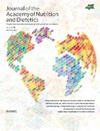大流行病期间的学校普及膳食:对加利福尼亚州和缅因州家长看法的混合方法分析》(A Mixed Methods Analysis of Parent Perceptions from California and Maine.
IF 3.5
2区 医学
Q2 NUTRITION & DIETETICS
Journal of the Academy of Nutrition and Dietetics
Pub Date : 2024-05-11
DOI:10.1016/j.jand.2024.05.005
引用次数: 0
摘要
背景:为应对 COVID-19 大流行,美国国会授权美国农业部免除各种学校膳食规定,并为所有学生提供免费的每日学校膳食,无论其家庭收入如何。由于联邦全民免费校餐(UFSM)已于2021-2022学年结束,包括加利福尼亚州和缅因州在内的几个州采取了州一级的全民免费校餐政策:本研究旨在了解家长对学校膳食以及加利福尼亚州和缅因州的联邦和新州级免费学校膳食政策的看法,包括对学生和家庭的潜在挑战和益处:设计:采用混合方法研究设计。在 2021-2022 学年期间,使用英语和西班牙语进行了定量横截面调查和半结构式访谈:定量调查的对象是加利福尼亚州(n=1,110)和缅因州(n=80)农村、郊区和城市社区的小学、初中和高中学生家长。然后使用 ZoomTM 对加利福尼亚州(n=46)和缅因州(n=20)的部分家长进行了定性访谈。大多数调查参与者(1190 人中有 708 人,占 59.5%)和受访者(66 人中有 40 人,占 60.6%)都是有资格享受免费或减价膳食(FRPM)的学生家长:主要结果测量:调查了家长对校外培训学校的看法、学校膳食质量以及申请免费或减价膳食的经历:采用比例检验法分析调查数据。两名经过培训的研究助理采用基础理论对访谈记录进行定性分析,运用内容分析原则确定主题和领域。结果结果:家长们认为,学校供餐和校外食堂管理计划为家庭节省了金钱和时间,因为家长们可以减少为孩子购买和准备膳食的次数。此外,校餐统一管理还减轻了家长的压力,减少了孩子和家长的耻辱感,因为他们以前填写校餐统一管理文件时曾感到尴尬。虽然家长对学校膳食的质量和健康程度看法不一,但大多数家长表示对学校膳食心存感激:结论:家长对学校膳食的质量和健康程度看法不一,但认为校餐统一管理为他们节省了金钱和时间,减轻了他们的压力。家长们还认为校餐统一管理减少了家庭的耻辱感。本文章由计算机程序翻译,如有差异,请以英文原文为准。
Universal School Meals During the Pandemic: A Mixed Methods Analysis of Parent Perceptions From California and Maine
Background
In response to the COVID-19 pandemic, the US Congress authorized the US Department of Agriculture to waive a variety of school meal regulations and funded school meals daily for all students at no charge regardless of family income. Because federal Universal Free School Meals (UFSM) ended with the 2021-2022 school year, several states, including California and Maine, adopted state-level UFSM policies.
Objective
This study aimed to understand parent perceptions of school meals and the federal and new state UFSM policies in California and Maine, including potential challenges and benefits to students and households.
Design
A mixed methods study design was used. A quantitative cross-sectional survey was administered, and semi-structured interviews were conducted in English and Spanish during the 2021-2022 school year.
Participants/setting
The quantitative survey was administered to parents of students in elementary, middle, and high schools in rural, suburban, and urban communities in California (n = 1110) and Maine (n = 80). Qualitative interviews were then conducted with a subset of these parents in California (n = 46) and Maine (n = 20) using Zoom (Zoom Video Communications). Most survey participants (708 of 1190 [59.5%]) and interviewees (40 of 66 [60.6%]) were parents of students who were eligible for free or reduced-price meals.
Main outcome measures
Parents’ perceptions of UFSM, school meal quality, and experiences applying for free or reduced-price meals were examined.
Analyses performed
Tests of proportions were used to analyze survey data. Using grounded theory, interview transcripts were analyzed qualitatively by 2 trained research assistants, applying principles of content analysis to identify themes and domains. Inter-rater reliability was conducted.
Results
Parents perceived that school meals and UFSM saved families money and time, as parents had fewer meals to purchase and prepare for their children. In addition, UFSM reduced parents’ stress and reduced stigma for children and for parents, who described feelings of embarrassment when they previously filled out paperwork for free or reduced-price meals. Although parent perceptions of school meal quality and healthfulness were mixed, most parents reported feeling grateful for school meals.
Conclusions
Parents had mixed opinions on the quality and healthfulness of school meals, but believed UFSM saved them money and time and reduced their stress. Parents also felt UFSM reduced stigma for families.
求助全文
通过发布文献求助,成功后即可免费获取论文全文。
去求助
来源期刊

Journal of the Academy of Nutrition and Dietetics
NUTRITION & DIETETICS-
CiteScore
7.20
自引率
10.40%
发文量
649
审稿时长
68 days
期刊介绍:
The Journal of the Academy of Nutrition and Dietetics is the premier source for the practice and science of food, nutrition, and dietetics. The monthly, peer-reviewed journal presents original articles prepared by scholars and practitioners and is the most widely read professional publication in the field. The Journal focuses on advancing professional knowledge across the range of research and practice issues such as: nutritional science, medical nutrition therapy, public health nutrition, food science and biotechnology, foodservice systems, leadership and management, and dietetics education.
 求助内容:
求助内容: 应助结果提醒方式:
应助结果提醒方式:


